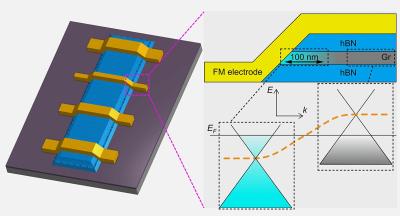Researchers find that graphene-on-chromia heterostructures show potential for spintronic devices
University of Nebraska-Lincoln's scientist Christian Binek and University at Buffalo's Jonathan Bird and Keke He have teamed up to develop the first magneto-electric transistor.
Along with curbing the energy consumption of any microelectronics that incorporate it, the team's design could reduce the number of transistors needed to store certain data by as much as 75%, said Nebraska physicist Peter Dowben, leading to smaller devices. It could also lend those microelectronics steel-trap memory that remembers exactly where its users leave off, even after being shut down or abruptly losing power.



 The image shows eight electrodes around a 20-nanometer-thick magnet (white rectangle) and graphene (white dotted line). Credit: University at Buffalo.
The image shows eight electrodes around a 20-nanometer-thick magnet (white rectangle) and graphene (white dotted line). Credit: University at Buffalo.